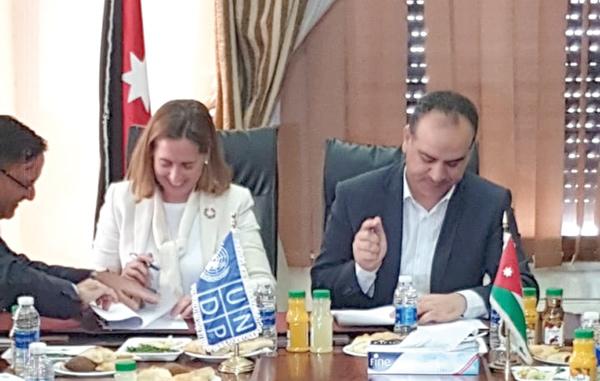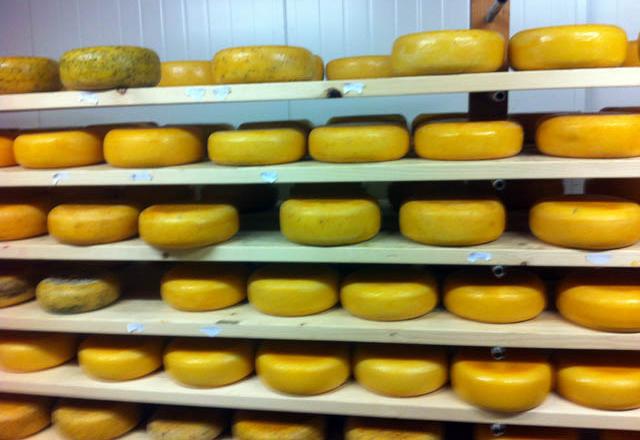You are here
UNDP ‘saves the season’ for sheep farmers amid COVID-19 curfew
By JT - May 12,2020 - Last updated at May 12,2020
The UNDP’s Badia project has supplied 25 local cooperatives with equipment and training to allow them to offer services to the communities of the northern, middle and southern badia that largely depend on sheep farming as a main source of income (Photo courtesy of UNDP)
AMMAN — The United Nations Development Programme (UNDP) in Jordan has implemented emergency measures to help livestock farmers in "saving the wool and milk season" and alleviating the effects of the nationwide curfew imposed to prevent the spread of the coronavirus.
The UNDP’s Badia project, which is being funded by the Ministry of Environment/Badia Restoration Programme and implemented in participation with the Ministry of Agriculture and the Jordan Cooperative Corporation, has supplied 25 local cooperatives with equipment and training to allow them to offer services to the communities of the northern, middle and southern badia that largely depend on sheep farming as a main source of income, according to a UNDP statement.
The Government of Jordan imposed a nationwide curfew that stopped most economic activity. The curfew came at the peak of the sheep milking season, and therefore all activities taking place in the spring including milking, sheep shearing and producing milk by-products such as cheese came to a complete halt, the statement noted.
According to some local cooperatives in the area, due to the curfew, shadow sheep-shearing activities emerged and livestock owners were exploited with high cost, low-quality manual methods, the statement said.
In coordination with the government, the UNDP intervened to allow organised sheep milking and shearing under strict health measures. Members of the local cooperatives were trained on modern and animal-friendly milking and shearing skills using advanced electrical shearing clippers, according to the statement.
Director of the Badia Hands Cooperative Ayada Al Sharafat said that members of his cooperative had to depend on manual shearing methods for years, which were economically unfeasible, expensive and limited in their consideration for animals’ well-being.
This local cooperative serves a population of 40,000 residents largely dependent on sheep farming as a sole source of income for decades, the statement said.
“During the lockdown, we were exploited by non-expert manual shearers who charged us double the usual cost for very bad service, until the UNDP intervened and quickly applied methods to help us,” Sharafat said in the statement.
At each local cooperative, staff were trained to teach members of the local community with new income-generating skills allowing them to provide quality service to a larger number of sheep and goat raisers.
Ghaith Al Ojayyan was trained to shear sheep by the project and offers freelance services to sheep and goat raisers in his community in Um Al Quttein. Before joining, he had no job; now he earns an average of JD40 ($56) a day.
“Although sheep farming has been our profession for years, I never learned how to properly shear sheep,” he said. “I was trained for a month on using electric shearing clippers and now I can shear a sheep in under one minute,” the university graduate with a major in history said.
The project also trained women of the community on this essential desert skill. Entissar Khaled, 18, learned how to use electric shearing clippers to cut sheep wool and care for the animals. Wearing personal protective gear, she prepares animals for the annual regimen with skill and ease.
The high school student is pleased she learned this skill because it is safer for the animals.
“I have raised sheep all my life, and I feel really happy to see that shearing is not painful for them anymore. The process is also faster and cleaner,” she added in the statement.
The UNDP has also ensured the quick and timely flow of fresh milk from sheep farmers to local cooperatives that are producing cheese.
Eleven cooperatives in the badia have been the recipients of training and modern equipment for cheese-making. The UNDP renovated and upgraded their dairy-production facilities with new production machines and small labs to test the quality of milk before processing.
During the lockdown, milk prices plummeted due to low demand, and the UNDP, together with the Minister of Environment and Acting Minister of Agriculture Saleh Kharabsheh, ensured that sheep farmers safely transport milk to societies at fair prices, according to the statement.
Members of the societies received training on business techniques, the policy-regulatory framework for micro- and small-enterprises in Jordan, in addition to tools to access big markets. They also received hands-on training on the best practices for cheese production, storage and hygiene practices.
The UNDP has also helped the local cooperatives develop Al Awassi Cheese, a national brand, known for its high quality and found in major markets across the region, the statement concluded.
Related Articles
AMMAN — The Ministry of Environment and the UNDP on Wednesday signed an agreement to boost wool production in the Jordanian Badia at a total
AMMAN — The UNDP, the Ministry of Agriculture and the Ministry of Environment, recently signed an agreement to establish the first-ever perm
To dive deeper into the realm of Dutch cheese one must abandon tasting imported cheese and Dutch lamp meat, and instead go to Texel or elsewhere in the Netherlands to gain a better understanding of the Dutch livestock industry and dairy production.


















